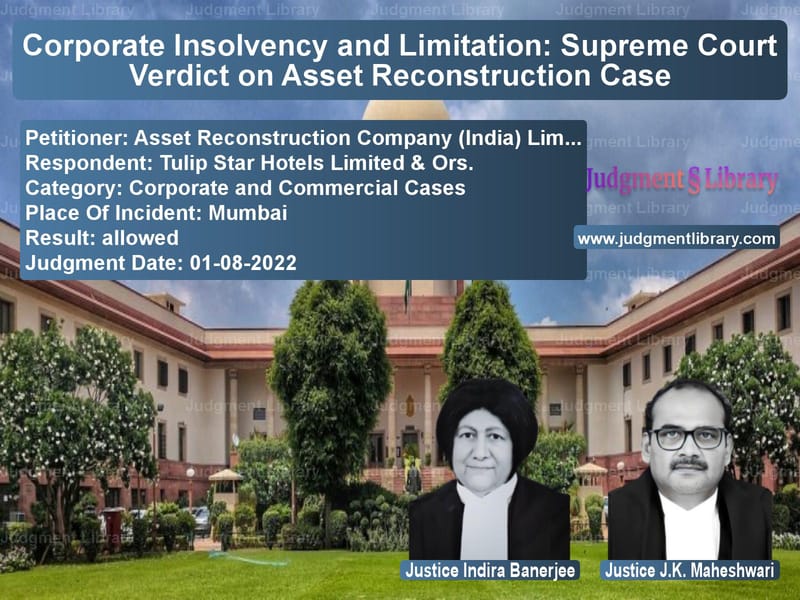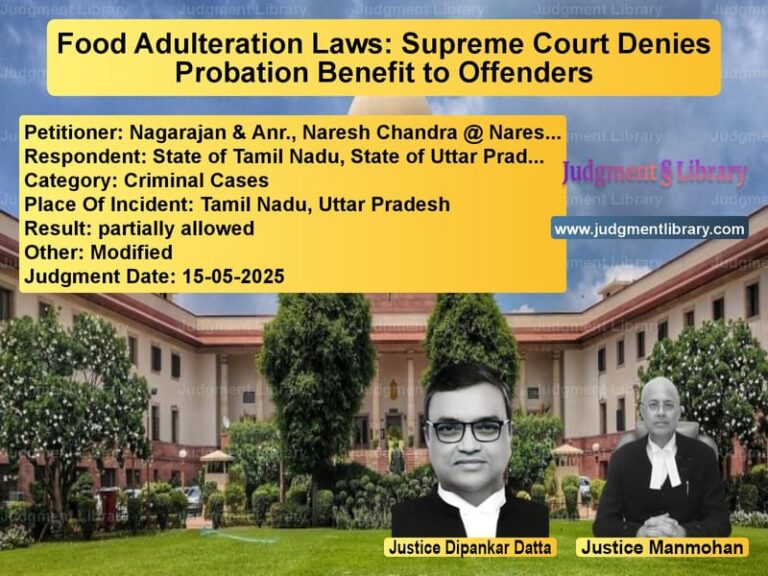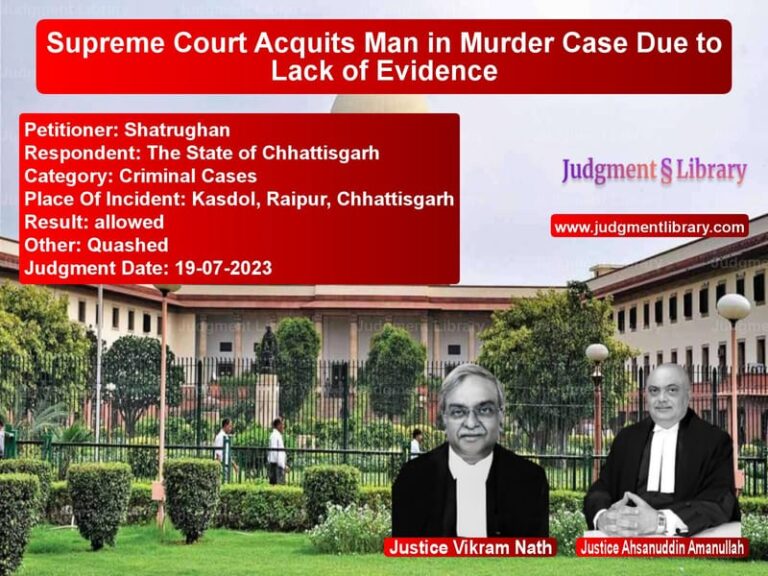Corporate Insolvency and Limitation: Supreme Court Verdict on Asset Reconstruction Case
The Supreme Court of India recently delivered a significant judgment in the case of Asset Reconstruction Company (India) Limited vs. Tulip Star Hotels Limited & Ors., which dealt with the application of limitation laws to the initiation of Corporate Insolvency Resolution Process (CIRP) under the Insolvency and Bankruptcy Code, 2016 (IBC). This case revolves around whether the CIRP filed by the financial creditor was barred by limitation and, more broadly, the impact of acknowledgments of debt in financial statements on limitation periods.
The appeal was filed by the financial creditor against the decision of the National Company Law Appellate Tribunal (NCLAT), which set aside an order of the National Company Law Tribunal (NCLT) that had admitted the CIRP application. The NCLAT held that the application was time-barred. However, the Supreme Court ruled in favor of the financial creditor, clarifying the legal position on the effect of acknowledgment of debt in financial statements and extending the limitation period.
Background of the Case
The dispute began with a loan agreement executed on March 8, 2002, between a consortium of banks, led by Bank of India, and the corporate debtor, V. Hotels Limited. The consortium sanctioned a loan of ₹129 crores to the corporate debtor. Subsequently, in 2003, the corporate debtor entered into an arrangement with Abu Dhabi Commercial Bank (ADCB) to refinance the loan. The corporate debtor’s account was classified as a Non-Performing Asset (NPA) on December 1, 2008.
Read also: https://judgmentlibrary.com/supreme-court-rules-on-nclt-members-tenure-and-selection-process/
On December 31, 2008, Bank of India assigned its receivables to Asset Reconstruction Company (India) Limited (ARCIL), the appellant in this case. The financial creditor sought recovery of dues through legal mechanisms, including initiating action under the Securitisation and Reconstruction of Financial Assets and Enforcement of Security Interest Act, 2002 (SARFAESI Act). However, the corporate debtor continued to dispute the claims and sought extensions.
Arguments by the Petitioner (Financial Creditor)
- The financial creditor argued that the corporate debtor had acknowledged its debt on multiple occasions, including in its financial statements from 2008-09 to 2016-17.
- It was submitted that the limitation period was extended through such acknowledgments under Section 18 of the Limitation Act, 1963.
- The CIRP application, filed on April 3, 2018, was within the extended limitation period.
- The financial creditor relied on previous Supreme Court judgments to argue that balance sheets and financial statements constituted valid acknowledgments of debt.
Arguments by the Respondents (Corporate Debtor and Shareholders)
- The corporate debtor contended that the CIRP application was filed well beyond the three-year limitation period from the date of default.
- It argued that financial statements did not constitute an unequivocal acknowledgment of debt.
- The corporate debtor claimed to have repaid the principal amount and disputed the interest demanded by the financial creditor.
- The respondents relied on the ruling in Gaurav Hargovindbhai Dave v. Asset Reconstruction Company (India) Ltd. to argue that the limitation period must be strictly followed.
Supreme Court’s Observations and Ruling
The Supreme Court analyzed the applicability of the Limitation Act to CIRP proceedings under the IBC. The Court held:
- An acknowledgment of debt under Section 18 of the Limitation Act extends the limitation period.
- Financial statements, when signed and submitted, constitute a valid acknowledgment of debt.
- The financial creditor had filed the CIRP application within the extended limitation period based on such acknowledgments.
- The IBC is a remedial statute aimed at resolution rather than mere recovery of debts.
Legal Precedents and Analysis
The Court referred to previous judgments such as:
- Babulal Vardharji Gurjar v. Veer Gurjar Aluminium Industries Pvt. Ltd. – This case had established that limitation for an application under Section 7 of the IBC is three years from the date of default.
- Dena Bank v. C. Shivakumar Reddy – It was held that acknowledgments of liability in financial statements extend limitation.
- Swiss Ribbons Pvt. Ltd. v. Union of India – The Court reaffirmed that the IBC is meant to ensure corporate revival.
The Court found that the financial creditor had demonstrated valid acknowledgment of debt, thus extending the limitation period.
Impact of the Judgment
This ruling provides significant clarity on:
- The importance of financial statements in determining acknowledgment of debt.
- The manner in which limitation periods apply under the IBC.
- The necessity for corporate debtors to maintain transparency in financial records.
By ruling in favor of the financial creditor, the Supreme Court has reinforced the principle that borrowers cannot evade liability by merely disputing claims when there is a clear acknowledgment of debt.
Petitioner Name: Asset Reconstruction Company (India) Limited.Respondent Name: Tulip Star Hotels Limited & Ors..Judgment By: Justice Indira Banerjee, Justice J.K. Maheshwari.Place Of Incident: Mumbai.Judgment Date: 01-08-2022.
Don’t miss out on the full details! Download the complete judgment in PDF format below and gain valuable insights instantly!
Download Judgment: asset-reconstruction-vs-tulip-star-hotels-li-supreme-court-of-india-judgment-dated-01-08-2022.pdf
Directly Download Judgment: Directly download this Judgment
See all petitions in Bankruptcy and Insolvency
See all petitions in Corporate Compliance
See all petitions in Judgment by Indira Banerjee
See all petitions in Judgment by J.K. Maheshwari
See all petitions in allowed
See all petitions in supreme court of India judgments August 2022
See all petitions in 2022 judgments
See all posts in Corporate and Commercial Cases Category
See all allowed petitions in Corporate and Commercial Cases Category
See all Dismissed petitions in Corporate and Commercial Cases Category
See all partially allowed petitions in Corporate and Commercial Cases Category







